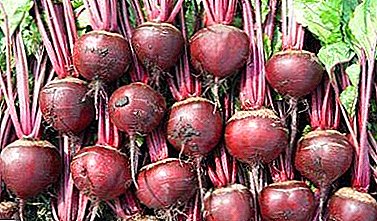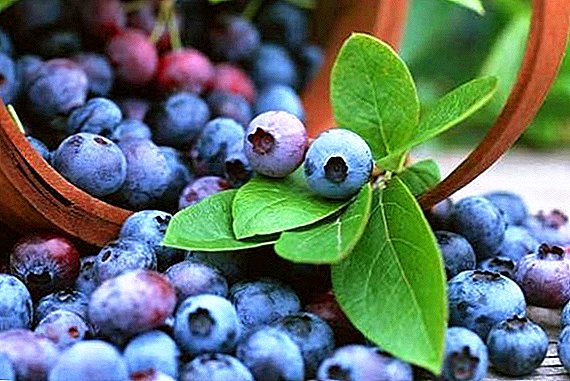 The small blue berries of the blueberry marsh shrub have long been established in the diet of many people. These berries have many beneficial properties.
The small blue berries of the blueberry marsh shrub have long been established in the diet of many people. These berries have many beneficial properties.
Therefore, the wild shrubs began to cultivate and plant in the garden plots. In the article we will tell about the blueberry varieties “Marvelous”, we will give its description, let's talk about the rules of care.
Variety description
Blueberries are heather bushes. This deciduous plant lives in moderately cold regions of the Northern Hemisphere. The variety of blueberries "Marvelous" was bred in the Central Siberian Botanical Garden of the Russian Academy of Sciences.
Did you know? The people have a lot of blueberry names - drunkard, gonobobel, stuffed cabbage (pigeon), stinky, blue grapes, tit.
Bush
The shrub is medium in size, up to 60 cm tall, spreading, with straight branching branches. Gives a lot of young shoots, so pruning is a must-have procedure.
Leaves are medium sized, hairless, leathery. The flowers are large, bright. Fruit brush is short, 5-7 berries. Possesses high frost resistance, maintains temperature of -42 ° C. 
Berry
The berries are large, round shape, slightly flattened, dark blue with a bloom. The berries have a sweet taste with sourness. The peel is thin, delicate, easily damaged. Therefore, storage and transportation is difficult.
Did you know? Blueberries have a lot of useful properties. It lowers blood sugar levels, makes breathing easier in case of sore throat, works as a diuretic and choleretic agent. And it stimulates the blood circulation of the retina.
Fruiting begins in the third year after planting. With one bush can be collected 1.5-1.6 kg of berries. 
Growing tips and tricks
The garden blueberry (to which the “Divnaya” variety belongs) is propagated by seedlings that are planted in spring or autumn. Optimally planted in the spring - during the summer the seedlings will take root, and the risk of freezing for young plants will be minimal.
Landing
Blueberry requires very acidic soils. The best option for disembarkation is a section that was under steam. The place should be on the sunny side, protected from the wind, well drained.
Berry will grow most productively on peat soils mixed with sand or loam. Such a soil can be created artificially under each bush with the help of peat and peat substrate.
In this case, be careful with the drainage and put stones on the bottom of the landing pit. Planting spend no fertilizer. They are not needed yet. Landing in peat pots. The root system of blueberry seedlings is very fragile, and improper planting can lead to rotting of the bush.
To prevent death, lower the container with the plant for 10-15 minutes into the water. After this, knead the earthy clod and straighten the roots. Sapling planted in a hole, watering and mulching.
When planting, cut the twigs: remove the weak ones completely, good ones - cut them in half. Further trimming after landing is not needed. 
Care
Blueberries love moist soil. She needs good watering, especially in the first year of growth. While the sapling does not take root, water it every other day. In the future, just keep the soil moist.
In the hot season, watering do every two days. Do not let the soil dry out. But the stagnation of water should be avoided. Be careful of drainage when planting a seedling.
In the summer you will need several times per season to loosen the soil to a depth of no more than 10 cm. Deeper is not necessary so as not to damage the roots of the bushes.
Mulch ping circles. This procedure allows you to keep moisture in the ground, will save in the winter from freezing. It is desirable to make a layer of mulch about 10-15 cm. As a material for mulching, sawdust, peat, compost will do.  Pristvolnye circles and aisles should be weeded periodically. You can sow siderats in the rows. This will protect your garden from weeds, and give additional protection to the roots of plants, and will serve as good material for mulching.
Pristvolnye circles and aisles should be weeded periodically. You can sow siderats in the rows. This will protect your garden from weeds, and give additional protection to the roots of plants, and will serve as good material for mulching.
Blueberries respond well to mineral fertilizers. Bring them in the spring, during the swelling of the kidneys. It is best to make ammonium sulfate, potassium and zinc, magnesium sulphate, superphosphate.
At the initial stages of growth bushes need nitrogen fertilizers. They are made three times in the first year of growth: in the spring of 40% of the annual norm, in May, 35%, at the beginning of June, 25% (approximately 70-90 g of fertilizers per plant).
With such a feed until spring, you can not worry about nitrogen fertilizers.
Important! After reaching the age of two, nitrogen fertilizers can be canceled. They will give a large increase in green mass, but fruiting will deteriorate.
 Superphosphate is used in the amount of 100 g per bush twice per season. Magnesium fertilizers are applied normally in 15 g per shrub. Potassium and zinc - at the rate of 2 g per plant.
Superphosphate is used in the amount of 100 g per bush twice per season. Magnesium fertilizers are applied normally in 15 g per shrub. Potassium and zinc - at the rate of 2 g per plant.Pruning young bushes can not do. Only in the spring remove weak and diseased branches.
Adult plants need to do anti-aging pruning. You can delete all the old shoots at a time, but then lose the crop for 2-3 years. The second option is to trim half of the branches in one year, and the second half in a year.
Protection against diseases and pests
Blueberries almost never suffer from diseases and pests.
Fungal diseases are most often damaged by plants - drying of branches, gray rot, monilioz of fruits.
Important! The most common cause of fungal diseases is stagnation of water due to violations of irrigation techniques.
 For prophylaxis, spray branches and leaves with a Bordeaux mixture in the spring. And spend the treatment of drugs such as "Topaz", "Topsin", "Fundazol." Treatment for treatment is carried out two or three times with a break of one week.
For prophylaxis, spray branches and leaves with a Bordeaux mixture in the spring. And spend the treatment of drugs such as "Topaz", "Topsin", "Fundazol." Treatment for treatment is carried out two or three times with a break of one week.Of the pests, the May beetles, aphids, and the silkworm deliver the greatest harm. Ripe berries are actively eaten by birds.
Larvae and beetles are harvested by hand and destroyed. To get rid of other insects, spray bushes "Karbofos", "Aktellikom." As a prevention spraying spend in the spring and after harvesting the berries. The treatment is carried out after the detection of pests on the leaves.
From birds helps fine-mesh, stretched over the bushes.
Advantages and disadvantages of the blueberry "Brave"
The advantages of the variety “Marvelous” include large berries, high winter hardiness, high yield, high content of vitamins. The disadvantage with some stretch is called the small height of the bush.  Blueberries "Marvelous" - a very useful and tasty berry. Plant it on the plot, it will not give you much trouble, but it will provide you with vitamins and a tasty delicacy.
Blueberries "Marvelous" - a very useful and tasty berry. Plant it on the plot, it will not give you much trouble, but it will provide you with vitamins and a tasty delicacy.












